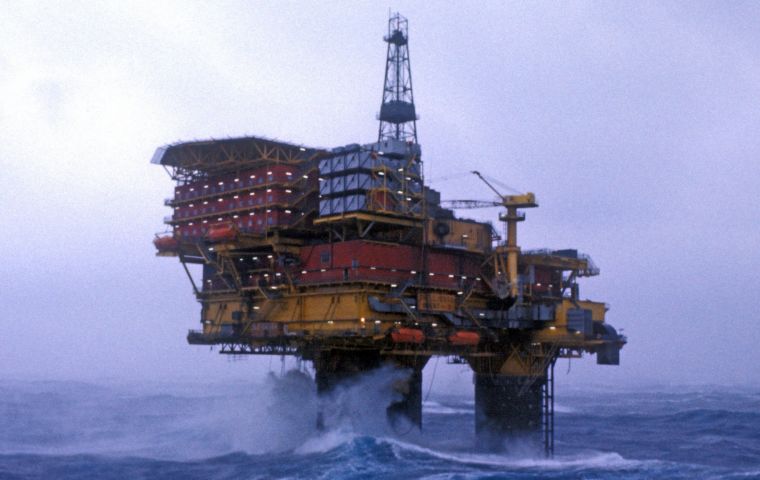MercoPress. South Atlantic News Agency
North Sea Oil Operators Set For Near Record Cash Flows
 The UK government is not willing to shut down the sector that provides 73% of the UK’s energy and meets 47% of its natural gas demand.
The UK government is not willing to shut down the sector that provides 73% of the UK’s energy and meets 47% of its natural gas demand. By Tsvetana Paraskova for Oilprice.com – UK North Sea operators will see near-record cash margins and profits this year as they will look to extend field lives amid high oil and gas prices in a “now or never” regulatory environment, energy consultancy Wood Mackenzie says.
The North Sea still looks pretty good for oil and gas operators in the short term, although long-term uncertainties over field development approvals and the UK’s net-zero goals continue to loom large over the industry.
“Production growth and near record cash flows in 2022 will strengthen balance sheets and keep economists happy,” Wood Mackenzie said.
Operators in the UK North Sea are expected to have booked US$ 17 billion in cash flows in 2021 and to book another US$ 18 billion cash flows in 2022, per WoodMac’s analysis cited by Sky News.
The massive cost cuts during the two most recent downturns and the current strong commodity prices will boost operators’ cash flow generation to the levels last seen before the 2008 crisis, according to Wood Mackenzie.
Despite the short-term windfall in cash flow generation, operators in the UK North Sea face uncertainties about future field development plans and tax liabilities as the UK looks to become a net-zero economy by 2050 and to significantly reduce the carbon emissions of North Sea oil and gas operations.
Due to this uncertainty, as much as 12 oil and gas projects could be sanctioned by the UK government in 2022 as operators could see this year as the last window of opportunity in a “now or never” moment to propose new developments, WoodMac says.
The near-record cash flows for the UK North Sea operators come at a time when the UK is struggling to find solutions to the energy crisis, with skyrocketing energy prices creating what some have said is already turning into a “cost of living crisis.”
The burden of the high energy prices could be lowered if the UK government imposes a so-called one-off “windfall tax” on oil and gas operators in the North Sea, opposition politicians have suggested in recent days. The opposition Labour Party wants a one-off windfall tax on North Sea oil and gas profits to pay for part of the party’s proposals to solve the energy crisis, said Rachel Reeves, Shadow Chancellor of the Exchequer.
The offshore oil and gas industry’s leading body, OGUK, slammed the Labour proposal saying that “windfall tax proposals offer false hopes to consumers – and the risk of real damage to UK industry.”
According to OGUK, “the increases were a global problem and showed the importance of protecting the UK industry rather than penalizing it.”
Moreover, the industry association warned that energy companies would become increasingly reluctant to make the long-term multi-billion-pound investments needed to extract North Sea resources if they are threatened with new windfall taxes whenever prices go up.
“In the longer-term a windfall tax would also be the worst thing for consumers because it would damage competitiveness, and discourage energy companies from investing in the UK,” said Jenny Stanning, OGUK External Relations Director.
“That would reduce our energy security and make us even more dependent on imports from places like Russia and the Middle East,” she added.
“The Europe-wide gas shortages are a stark reminder of why the UK should safeguard its offshore sector – and financial stability is an essential part of that,” Stanning noted.
The UK government is not willing to shut down the sector that provides 73% of the UK’s energy and meets 47% of its natural gas demand. But authorities have recently proposed that new project developments pass a so-called net-zero compatibility test.
The UK will still allow the development of new oil and gas oilfields in the North Sea if they pass a net-zero test, the government said last month as it opened a consultation seeking input on a new climate compatibility checkpoint for the oil and gas industry.
“It is vital that this checkpoint is robust and ensures that future licensing rounds are compatible with the UK’s climate change ambitions while maintaining investor confidence in the UK Continental Shelf,” said Katy Heidenreich, Supply Chain & Operations Director at OGUK.




Top Comments
Disclaimer & comment rulesCommenting for this story is now closed.
If you have a Facebook account, become a fan and comment on our Facebook Page!